Pair
Valve (Secondary Air System) Removal Made Easy
|
| by "Moccasin" Mike |
| ********************************************************* |
For the
C90 Boulevard
Click here for
printable Text Only Instructions
Many thanks to my friend Bill Schmahl "Geesh" for the wonderful photographs and
technical help in preparing these instructions!
Click here to see a shot of Bill's gorgeous Naked Bully Jugs!
NOTE** The only tools you will need for
this operation are a pair of pliers, a 6mm hex (allen) wrench,
a phillips head screwdriver and a 10mm wrench. These can be found in your Suzuki Tool Kit. (Add
a second 10mm wrench if you plan to remove the cylinder studs).
This procedure will take about an hour if you work real slow. J
All metal components of the removal kits have been "Blackened"
with satin finish engine paint, and baked at 400 degrees to match
your engine block.
|
The chrome cover is held in place by two allen head
bolts. Your bolts may have button caps covering the allen sockets, if so,
use a sharp pointed knife to pry the chrome button
cap off, then use a 6mm hex (allen) wrench to remove the screws, and pull
the cover. |

|
| STEP 2. CLAMPS,
NUTS, BOLTS, AND VALVE. |
|
With a pair of pliers loosen and slide the
upper tube hose clamps toward the center of the rubber tubing, and pull the
two rubber tubes from the pair valve body. |
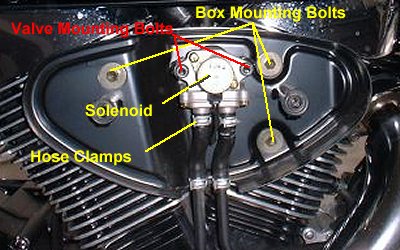 |
| If you only wish to disable the pair
valve, but not remove any of it's components, insert round head screw
or golf tee
upside down into each lower rubber tubing piece. leave a
small piece of the threaded or pointed end sticking out of the the top of the
rubber tube (for removal later if necessary), and re-install the
tubes to the pair valve and replace the cover. For a visual reference for disabling the system
without removing components, CLICK HERE. |
Continue with Removal |
|
With a 10mm wrench, remove the lower tube flange nuts from
each cylinder. (4 nuts total) Now you can easily slip the metal tubes off
the cylinder studs.
Make sure that no gasket material remains on the cylinder
flanges. |
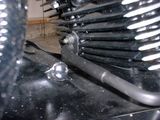
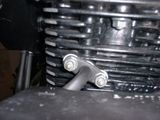
Rear Metal Tube & Flange Front Tube & Flange
|
Loosen but do not remove the two small Phillips screws
holding the solenoid to the pair valve body..
Remove the three 10mm Box Mounting Bolts. |
 |
| |
| Holding the box loosely away from the engine, reach behind
it and pull the rubber air hose loose, either from the back of the valve
body or from the metal connecting adapter just under the side panel (fake
tank panel). (metal connecting adapter shown at right) |
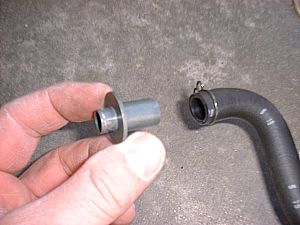 |
| Now disconnect the electrical solenoid connection just under
the side panel and remove the box and pair valve as a unit. |
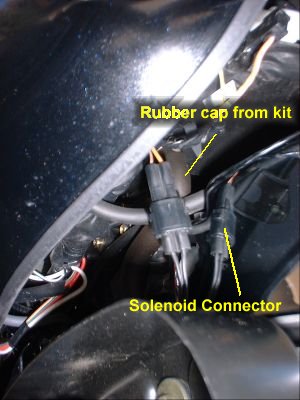 |
| Pull the remaining section of rubber air inlet hose free
from the bottom of the air filter box, paying close attention to where it
comes from, then cap the air box outlet nipple with the larger of the two
rubber caps from the removal kit. Its a good idea to use the retaining clip
on the rubber cap, but you may need to compress it a bit beforehand to give
it a snug fit. |
 |
| Remove the two gold colored Phillips head solenoid mounting
screws, then pull the solenoid and its wire pigtail free from the valve body
and box, feeding the wire through from the back of the case as you pull . |
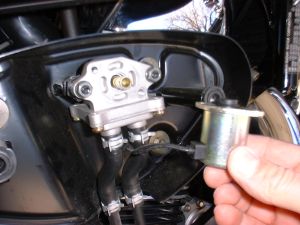 |
| Reconnect the solenoid to the bike's connector, and use the
two supplied plastic zip ties to secure it up out of site, behind the side
panel. This can be done by looping the zip ties over the main wiring harness
and through the solenoid screw holes, then cinch them up to the main
harness. |
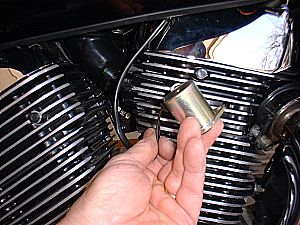 |
NOTE:
An alternative to retention of the solenoid is replacing it with a 4.7k-Ohm
1/4 Watt inline resistor. You can learn more about that
HERE. |
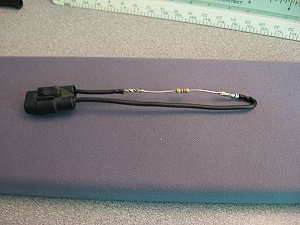 |
| STEP 3.
BLOCK THE CYLINDER PORTS |
Using the gaskets and plates from the kit, cover the two
cylinder ports. Some people prefer to use a little high temp gasket sealer on
the gaskets, but it is not a necessity. You may secure the plates to the
cylinders using the existing nuts that were removed earlier (and lock washers
from the kit), or for a slightly cleaner (but a bit risky) look, you can remove
the studs from the cylinders and use the four supplied M6-1.0x16mm (long)
bolts and lock washers. See stud option note below.
| STEP 4. PLUG THE
SCREW HOLES |
Use the three supplied M6-1.0x10mm (short)
Stainless Steel bolts and lock washers to fill the empty holes in
the cylinders left by removing the housing.
YOU’RE DONE!! Donít you wish YOU could loose five pounds
of ugly fat that easy!!!

NOTE* There are an additional four M6-1.0x16mm
Stainless bolts and washers supplied with the kit. These are for
replacing the cylinder studs, if you desire to do so.
REPLACING STUDS: If you haven’t pulled
studs before; thread two nuts on the stud and tighten them very
tightly against each other (opposite directions toward each other),
then put a wrench on the inner nut, and as you try to "unscrew"
it, the whole stud will unscrew. You may have to apply a little
"counter pressure" to the outside nut with another
wrench at the same time.
CAUTION! - Bear in
mind that anytime you work with studs, you run the risk of
breaking the stud off, requiring difficult drilling and tapping
to replace it. Pre-soaking the threads with penetrating oil, and
a few light taps straight on the end of the stud with a light
hammer will help break loose the hold of any corrosion inside. If
the stud seems to require a lot of force, leave it be!
Use your "Back" button or
Click HERE
to go back










